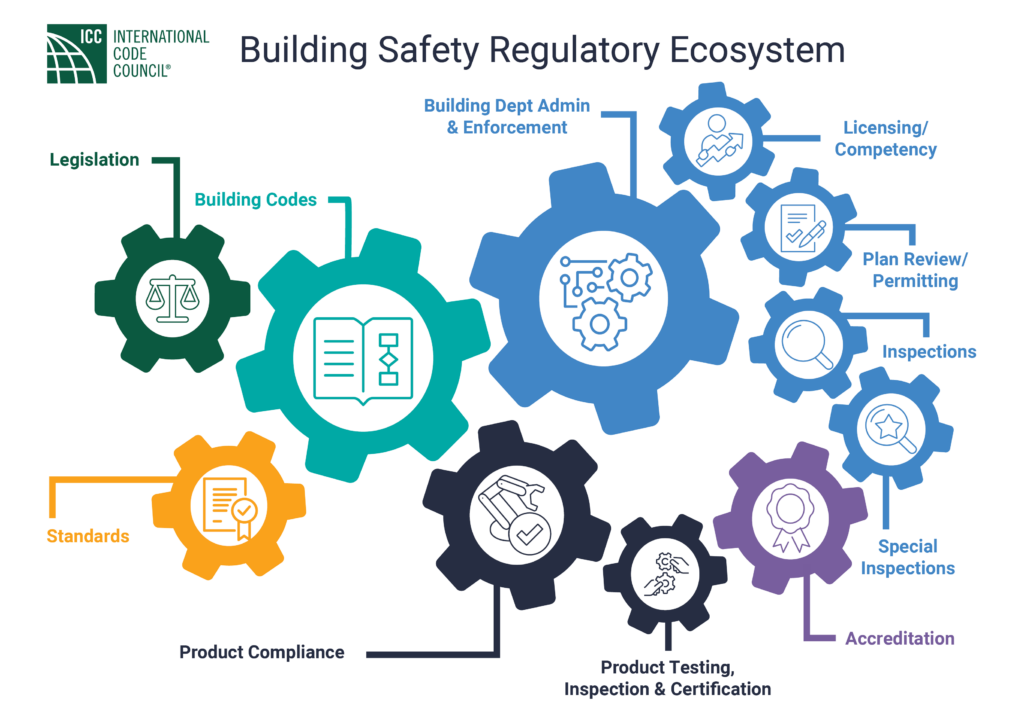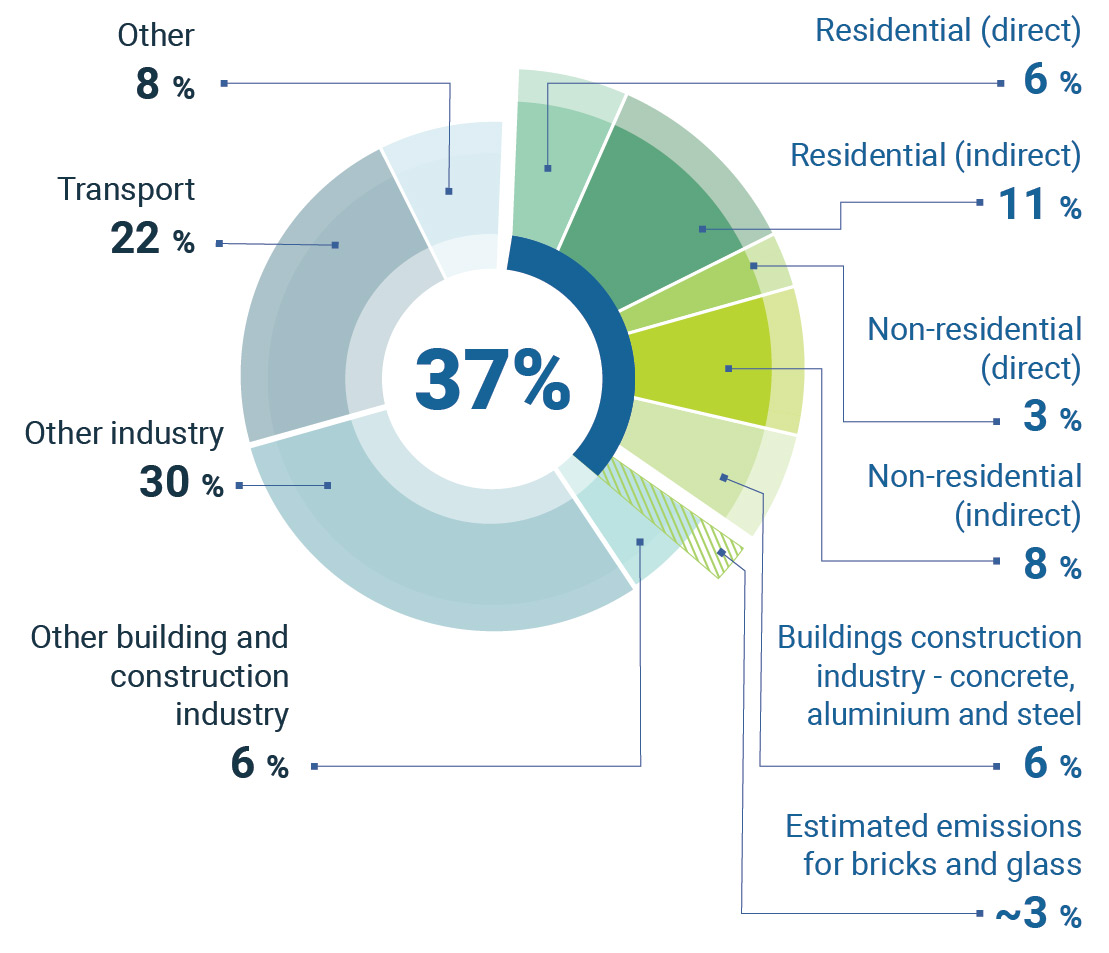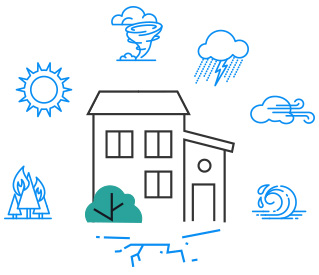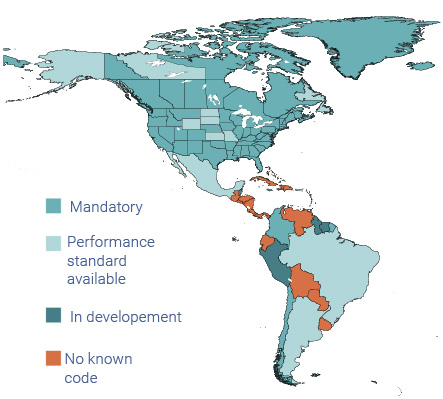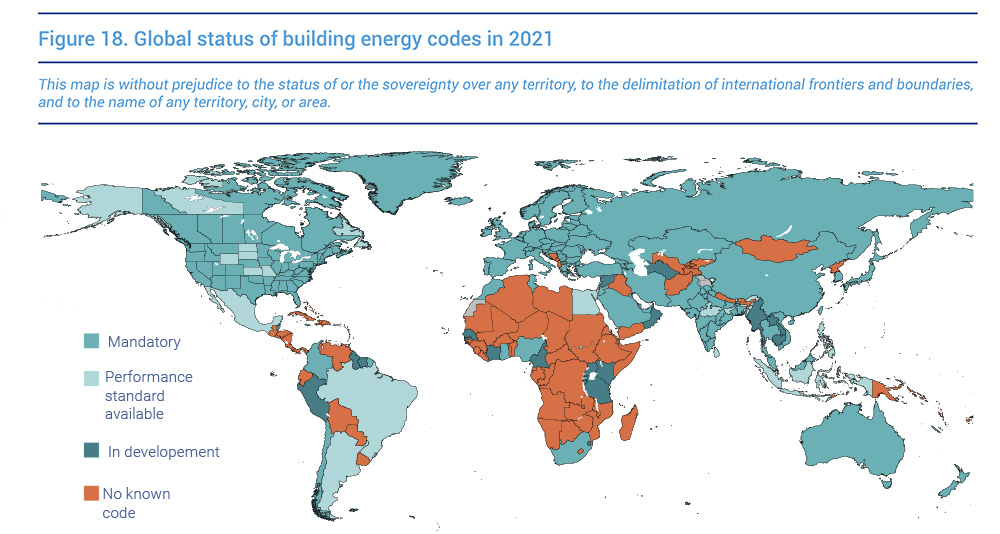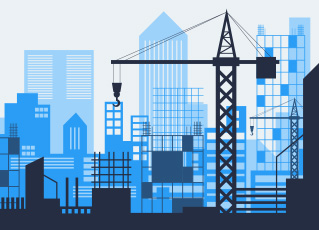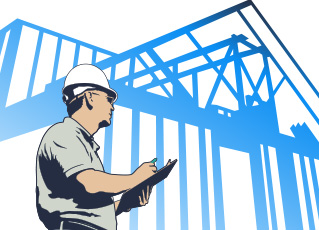
Building Capacity for Sustainable and Resilient Buildings
An International Commitment in Support of the Buildings Breakthrough
Buildings are a significant contributor to the emissions that drive climate change. Building codes (including energy codes) provide a highly effective approach to reducing building-related emissions and enhancing resilience. Unfortunately, the current adoption and effective implementation of global building codes has fallen short, leaving their impact vastly unrealized.
The Building Capacity for Sustainable and Resilient Buildings initiative emphasizes the importance of having and using the tools needed to create a robust building regulatory ecosystem.
Building Safety Regulatory Ecosystem
In support of the Sustainable and Resilient Buildings initiative, the International Code Council is producing a free toolkit, accessible by jurisdictions around the world to identify and improve the elements of their building safety regulatory ecosystems most critically in need.
Supporting the Buildings Breakthrough
The Buildings Breakthrough, an international initiative co-led by France (Ministry of Ecological Transition) and the Kingdom of Morocco (Ministry of National Territory Planning, Land Planning, Housing and City Policy) and coordinated under the umbrella of the UNEP-hosted Global Alliance for Buildings and Construction (GlobalABC), is a call to all countries to accelerate the transition to sustainable buildings for everyone everywhere. The Buildings Breakthrough targets the universal adoption and implementation of near-zero emission and resilient buildings by 2030.
The Building Capacity for Sustainable and Resilient Buildings campaign is a supportive initiative to the Buildings Breakthrough, assisting countries and businesses across the world to enhance their building-related policies and enforcement capacity to ensure the safe, sustainable and resilient development and maintenance of the global building stock. Learn more about the Buildings Breakthrough here.
Read the new Interim Report in Support of the Buildings Breakthrough Priority Action 5, released in November 2024.
Aligned with the G20 Disaster Risk Reduction Working Group Commitment
The Group of 20 (G20) Disaster Risk Reduction Working Group (DRRWG) assembled in July 2023 in India, with a shared determination to address the challenges posed by disasters and a commitment to a future where disaster risks are reduced and prevented for all. To promote disaster and climate resilient infrastructure, the G20 Countries agreed on “the importance of developing and strengthening legislative and regulatory frameworks and of strengthening sectoral planning for infrastructure resilience. In this regard, we reiterate the importance of promoting multi-hazard risk assessments as a prerequisite for infrastructure project appraisals and financing and of regularly conducting stress tests of interconnected critical infrastructure systems. To build synergies in this area, we underscore the importance of each nation adopting and enforcing appropriate codes and standards for disaster and climate resilient infrastructure that are based on an understanding of current and future risks and climate projections, taking into account best available science, in line with its national context."
Impact of Buildings and Construction
Buildings are a significant contributor to the emissions that drive climate change. Buildings and construction operational and process CO2 emissions are responsible for 37 percent of the global share of emissions. The impact at the city scale is often higher.
Buildings Delivering Climate Resilience
At the same time the built environment can provide resilience against the current and growing impacts of extreme weather events exacerbated by climate change.
The Role of
Building Codes
Building codes (including energy codes) provide a highly effective approach to reducing building-related emissions and enhancing resilience. Unfortunately, their adoption and effective implementation is not commensurate with their impact.
Lack of Mandatory Energy Codes
Only 26 percent of countries have adopted mandatory energy codes at the national level for all building types. Further, 82 percent of the population growth expected through 2030 will occur in countries without mandatory energy codes.
Need for Strong Building Regulation
Well-designed building regulations, particularly building codes and procurement rules, are the simplest approach to enhancing the reliability and resilience of infrastructure services. Investing in more resilient infrastructure globally, such as adopting and implementation of hazard resilient buildings codes, could also save $4.2 trillion in climate change damages.
Need for
Implementation
Just as essential as the adoption of building and energy codes that lead to achievement of sustainability and resilience is their effective implementation. Jurisdictions require a robust regulatory infrastructure accompanied by ongoing training and assessment of competence of all participants in the design, construction, operation and regulatory process.
Resources
The following resources from partner organizations provide tools for the effective adoption and implementation of building codes.
Join the Commitment
For additional information and to sign on as a partner organization, please contact Ryan Colker at ICC at rcolker@iccsafe.org.



